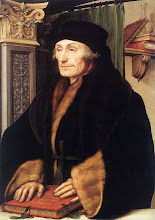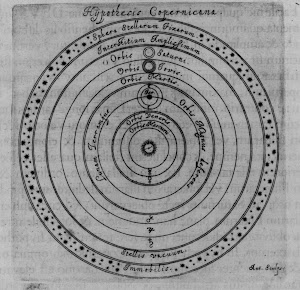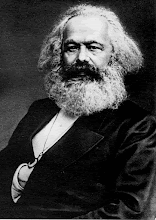 How does the emotionalism of this passage relate to enlightened thinkers' fascination with the passions and the workings of human reason? Did eighteenth-century religious thinkers and religious practices accept or reject new enlightened ideas about human nature and behavior? How would Voltaire have responded to Wesley and his revivalism? Why did Wesley hold such large, outdoor religious meetings, and what might the establishment church have thought about this? (page 497)
How does the emotionalism of this passage relate to enlightened thinkers' fascination with the passions and the workings of human reason? Did eighteenth-century religious thinkers and religious practices accept or reject new enlightened ideas about human nature and behavior? How would Voltaire have responded to Wesley and his revivalism? Why did Wesley hold such large, outdoor religious meetings, and what might the establishment church have thought about this? (page 497)Thursday, December 18, 2008
“The Conversion Experience in Wesley's Methodism”
 How does the emotionalism of this passage relate to enlightened thinkers' fascination with the passions and the workings of human reason? Did eighteenth-century religious thinkers and religious practices accept or reject new enlightened ideas about human nature and behavior? How would Voltaire have responded to Wesley and his revivalism? Why did Wesley hold such large, outdoor religious meetings, and what might the establishment church have thought about this? (page 497)
How does the emotionalism of this passage relate to enlightened thinkers' fascination with the passions and the workings of human reason? Did eighteenth-century religious thinkers and religious practices accept or reject new enlightened ideas about human nature and behavior? How would Voltaire have responded to Wesley and his revivalism? Why did Wesley hold such large, outdoor religious meetings, and what might the establishment church have thought about this? (page 497)Friday, November 7, 2008
“A Witchcraft Trial in France”
 What does this document tell us about the spread of witchcraft persecutions in the seventeenth century? What does this document tell you about the legal procedures involved in the trial of witches and how might these procedures have worked to condemn the innocent? What do these passages tell you about early modern European conceptions of justice? What does the trial record suggest about the status of women in the seventeenth century? (page 412)
What does this document tell us about the spread of witchcraft persecutions in the seventeenth century? What does this document tell you about the legal procedures involved in the trial of witches and how might these procedures have worked to condemn the innocent? What do these passages tell you about early modern European conceptions of justice? What does the trial record suggest about the status of women in the seventeenth century? (page 412)
Friday, October 31, 2008
Las Casas and the Spanish Treatment of the American Natives

"[The Spaniards] took babies from their mothers' breasts, grabbing them by the feet and smashing their heads against rocks. ... They built a long gibbet, low enough for the toes to touch the ground and prevent strangling, and hanged thirteen [natives] at a time in honor of Christ Our Savior and the twelve Apostles. ...Then, straw was wrapped around their torn bodies and they were burned alive."
In what ways did this account help to create the image of teh Spaniards as "cruel and murderous fanatics?" What motives may have prompted Las Casas to make this critique and how might his opinions affect the broader standing of Spain in global politics of the era? Did his criticisms of early Spanish rule have any impact? If so, what? (p. 390)
Monday, October 13, 2008
"A Reformation Debate: The Marburg Colloquy"
 What is the issue being debated by Luther and Zwigli? What would have been the Catholic Church's position if Catholic representatives had been included in the debate? Based on this example, why do you think the Reformation debates led to further hostility rather than the compromise and unity between relitious and sectarian opponents? (page 359)
What is the issue being debated by Luther and Zwigli? What would have been the Catholic Church's position if Catholic representatives had been included in the debate? Based on this example, why do you think the Reformation debates led to further hostility rather than the compromise and unity between relitious and sectarian opponents? (page 359)Thursday, September 25, 2008
EXTRA CREDIT POST: “A Woman’s Defense of Learning”
 How does Laura Cereta explain her intellectual interests and accomplishments? Why were Renaissance women rarely taken seriously in their quest for educational opportunities and recognition for their intellectual talents? Were any of those factors unique to the Renaissance era? Can Cereta be described as a “feminist”? Why or why not? (page 329)
How does Laura Cereta explain her intellectual interests and accomplishments? Why were Renaissance women rarely taken seriously in their quest for educational opportunities and recognition for their intellectual talents? Were any of those factors unique to the Renaissance era? Can Cereta be described as a “feminist”? Why or why not? (page 329)
Wednesday, September 24, 2008
Machiavelli: "Is It Betther to be Loved than Feared?"
 What does Machiavelli have to say about being loved rather than feared? How do his theories in this regard make his politics modern and distinguish his advice from Greco-Roman notions of good rulership? Are Machiavelli’s comments in the excerpt at all relevant to today’s democratic politics? (page 325)
What does Machiavelli have to say about being loved rather than feared? How do his theories in this regard make his politics modern and distinguish his advice from Greco-Roman notions of good rulership? Are Machiavelli’s comments in the excerpt at all relevant to today’s democratic politics? (page 325)Monday, September 8, 2008
“A Feminist Heroine: Christine de Pizan or Joan of Arc”
 Is Christine de Pizan’s poem about the triumphs of Joan of Arc a “feminist” literary work? Why or why not? (Define “feminist.”) What are the religious references and allusions in the poem? What are the references to the classical world? In subject matter, is there anything “modern” in the poem? Does the work better reflect the waning Middle Ages or the waxing Renaissance? How and why? (page 295)
Is Christine de Pizan’s poem about the triumphs of Joan of Arc a “feminist” literary work? Why or why not? (Define “feminist.”) What are the religious references and allusions in the poem? What are the references to the classical world? In subject matter, is there anything “modern” in the poem? Does the work better reflect the waning Middle Ages or the waxing Renaissance? How and why? (page 295)Thursday, March 27, 2008
Advice to Women: Be Independent

Monday, March 10, 2008
“Darwin and the Descent of Man”
 What is Darwin's basic argument in The Descent of Man? Why did so many object to it when first published in 1871? In your opinion, were those objections justified? Was Darwin a product of his own times? If so, how? In your opinion, what forces in nineteenth-century European society conjoined to stimulate Darwin's thinking and publication on this subject? (page 643)
What is Darwin's basic argument in The Descent of Man? Why did so many object to it when first published in 1871? In your opinion, were those objections justified? Was Darwin a product of his own times? If so, how? In your opinion, what forces in nineteenth-century European society conjoined to stimulate Darwin's thinking and publication on this subject? (page 643)
Tuesday, March 4, 2008
Extra Credit Post: “Bismarck ‘Goads’ France into War”
Tuesday, February 26, 2008
Garibaldi and Romantic Nationalism
 Why did Garibaldi become such a hero to the Italian people in 1860? Does it appear from the newspaper account that Garibaldi was a charismatic leader? If so, how? How important is charisma in a revolutionary leader? How does Garibaldi's comportment (look it up!) as a political and military leader prefigure the conduct of later revolutionary military leaders and activists (think of Vladimir Lenin, Emiliano Zapata, Pancho Villa, Ho Chi Minh, Fidel Castro, Che Guevara, Malcom X)? (p. 627)
Why did Garibaldi become such a hero to the Italian people in 1860? Does it appear from the newspaper account that Garibaldi was a charismatic leader? If so, how? How important is charisma in a revolutionary leader? How does Garibaldi's comportment (look it up!) as a political and military leader prefigure the conduct of later revolutionary military leaders and activists (think of Vladimir Lenin, Emiliano Zapata, Pancho Villa, Ho Chi Minh, Fidel Castro, Che Guevara, Malcom X)? (p. 627)
Wednesday, February 20, 2008
The Voice of Liberalism: John Stuart Mill on Liberty
 How do Mill's ideas fit into the concept of democracy, safety and national security? Is Mill a democrat? Why and/or why not? What is more important in his thought: the individual or society? What do you believe to be the historic sources or inspirations of Mill's ideas? According to the tenets of the early twenty-first century, would Mill be described as a liberal or a conservative or neither? Why? (page 600)
How do Mill's ideas fit into the concept of democracy, safety and national security? Is Mill a democrat? Why and/or why not? What is more important in his thought: the individual or society? What do you believe to be the historic sources or inspirations of Mill's ideas? According to the tenets of the early twenty-first century, would Mill be described as a liberal or a conservative or neither? Why? (page 600)
Sunday, February 3, 2008
“The Voice of Conservatism: Metternich of Austria”
 Based on Metternich's discussion, how would you define conservatism? What experience obviously conditioned Metternich's ideas? Was Metternich and early nineteenth century conservatism merely a reaction to the events of the French Revolution? Why and/or why not? Based on this selection, discuss the actual policies Metternich would have wanted his government to pursue. (page 592)
Based on Metternich's discussion, how would you define conservatism? What experience obviously conditioned Metternich's ideas? Was Metternich and early nineteenth century conservatism merely a reaction to the events of the French Revolution? Why and/or why not? Based on this selection, discuss the actual policies Metternich would have wanted his government to pursue. (page 592)
Sunday, January 27, 2008
“Discipline in the New Factories” (page 568)

As seen in this document (and illustrated above), what impact did factories have on the lives of workers? To what extent have such “rules” determined much of modern industrial life? How is your life marked by the historical development of such rules? Are today’s workers still only “hands” in the opinion of many employers?
Sunday, January 13, 2008
The Declaration of the Rights of Woman and the Female Citizen
What rights for French women does this document assert? Given the nature and scope of argument in favor of women's rights here, what key effects on European society can you now attribute to the French Revolution? Are there any of Olympe de Gouges’ “Rights of Women and of Female Citizens” which have yet to be achieved in western society? If so, which ones, and why? (page 541)
Subscribe to:
Comments (Atom)






























